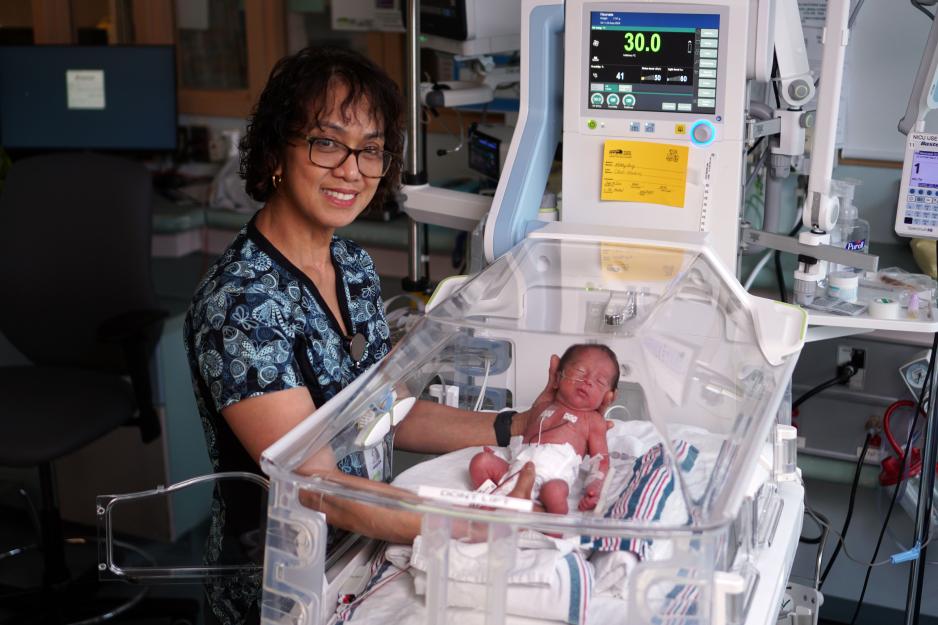Michael Garron Hospital’s (MGH) Neonatal Intensive Care Unit (NICU), formerly known as the Special Care Nursery, is now home to 14 new incubators that further support the high-quality, life-saving care the unit offers to the hospital’s tiniest patients.
Incubators are small, specialized beds that allow babies to receive care in place. They include a built-in warmer, which keeps the baby’s temperature stable, and phototherapy light, which helps treat jaundice – a condition that some newborns may have.
Doctors, nurses and other care providers can also adjust the height of the incubator, allowing parents to have better access to their baby and for the baby to receive critical care without having to be moved from the bed.
Sung-Ju Hong, Registered Nurse (RN) in MGH’s NICU, says this feature is especially helpful for parents who use wheelchairs or other mobility devices. “They're coming in and can be as close to their baby as possible.”
The new incubators join the MGH NICU’s existing set of specialized staff and medical equipment, which allows the unit to provide high-quality, life-saving care to babies and families closer to home. They were made possible by generous contributions from MGH Foundation donors, particularly the Garron family.
“This incredible support means our NICU Team can use the most updated and state-of-the-art technologies to support babies and families in our community,” says Dr. Sehr Ansari, Neonatologist at MGH. “This helps us provide the best possible care to our patients.”
Providing specialized, life-saving care close to home
MGH’s NICU provides care to moderately sick babies who are as young as 30 weeks old. These babies were born at MGH or transferred from other hospitals.
The unit is staffed by an interdisciplinary team of healthcare professionals who have specialized training. These individuals include neonatologists (doctors who specialize in caring for newborn babies, especially those who are sick or born prematurely), nurses, respiratory therapists, dietitians, lactation consultants, pharmacists, social workers and more.
Along with Dr. Ansari, Dr. Jejelola Ladele is one of two neonatologists at MGH. Dr. Ladele has expertise in point-of-care echocardiography, neonatal hemodynamics and peripherally inserted central catheter lines (PICC).
She says these specialized skills and knowledge strengthen the services offered in the unit.
“This skillset means we can provide a fuller spectrum of critical care for ill and premature babies, so families can get all the specialized supports they need in one place without the stress of having their baby transferred to another hospital or care facility unless absolutely necessary.”
Families in MGH’s NICU are also encouraged to be active members of their baby’s medical team as we practice family-integrated care in our NICU
“We invite families to participate in reviewing their baby’s care plan and we teach them how to care for their babies,” says Dr. Ansari.
"There is evidence that babies, especially those who are pre-term, have much better development outcomes when they are provided with family-integrated care. This approach also eases parental anxiety.”
With the support of Drs. Ansari and Ladele, MGH’s NICU Team also offers several specialty care clinics, including the Neonatal Development Follow-Up Clinic, which supports babies at high risk of neurodevelopment impairments, and the Newborn Assessment Clinic, which provides care for babies who need to be seen urgently and are referred by their family doctor or primary care physicians.
A new name and collaborating with Family Birthing Centre
MGH’s NICU partners with other hospitals to coordinate additional care and consultations where needed. The unit also collaborates with the Family Birthing Centre (FBC) to support high-risk deliveries and respond to neonatal emergencies like resuscitation.
“We always ensure that the safety of the patient is the priority,” says Miguela Ramos, a ward aide who has worked at MGH for 35 years, including three years in the NICU.
To better reflect the MGH NICU’s classification as a Level 2 NICU, as defined by Critical Care Services Ontario (CCSO), the NICU became formally known by this name in fall 2024.
Prior to this, the unit was known as the Special Care Nursery where, for decades, it provided care for thousands of babies and families. As MGH has evolved over the years, so has this unit’s ability to support acutely ill and premature babies thanks to its dedicated team of specially trained healthcare professionals and increased availability of intensive care equipment.
Raju Bains, Director of Maternal, Newborn and Child Health Services at MGH, which includes both the NICU and FBC, understands firsthand the incredible impact of NICU Teams. “My twins were born at just over 30 weeks and spent time in a NICU in Toronto before going home,” she says. “Witnessing this remarkable, life-saving care in action from a patient’s perspective motivates me to lead and support our team at MGH every day.
“We're incredibly proud of the care we provide in our NICU and look forward to continuing to support the needs of our diverse communities,” Raju adds.
“Ensuring this unit is known as the NICU further acknowledges the high-quality, compassionate and specialized level of care we provide to our patients and families,” Dr. Ansari says. “It also reflects the evolution of our team’s collaborative work.”

